


Framed or unframed, desk size to sofa size, printed by us in Arizona and Alabama since 2007. Explore now.
Shorpy is funded by you. Patreon contributors get an ad-free experience.
Learn more.

- Baldwin 62303
- Baldwin VO-1000
- Cold
- No expense spared
- Tough Guys
- Lost in Toyland
- And without gloves
- If I were a blindfolded time traveler
- Smoke Consumer Also Cooks
- Oh that stove!
- Possibly still there?
- What?!?
- $100 Reward
- Freeze Frame
- Texas Flyer wanted
- Just a Year Too Soon
- WWII -- Replacing men with women at the railroad crossing.
- Yes, Icing
- You kids drive me nuts!
- NOT An Easy Job
- I wonder
- Just add window boxes
- Icing Platform?
- Indiana Harbor Belt abides
- Freezing haze
- Corrections (for those who care)
- C&NW at Nelson
- Fallen Flags
- A dangerous job made worse
- Water Stop
Print Emporium
Shantytown Baby: 1936
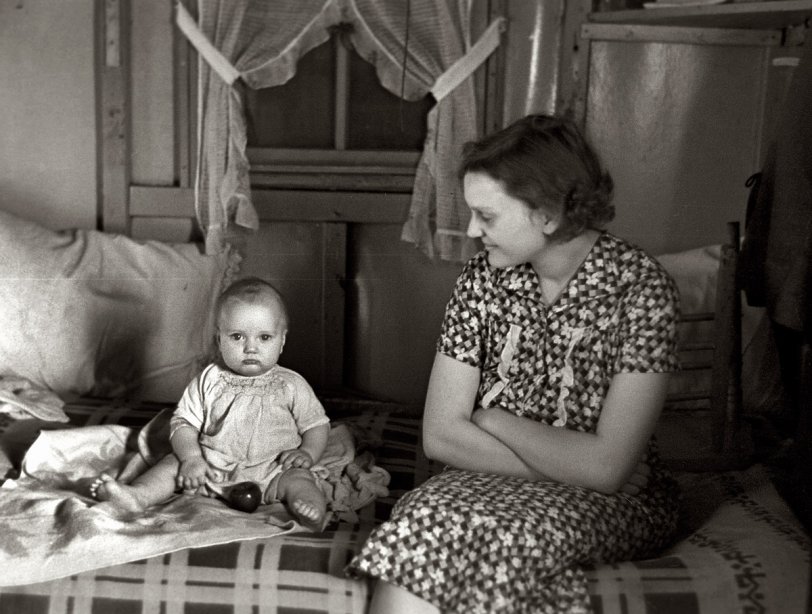
December 1936. "Mrs. Charles Benning and baby in their shack home at Shantytown. Spencer, Iowa." View full size. 35mm negative by Russell Lee.
This Great Depression will
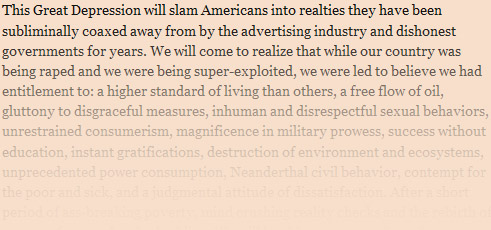
["Realties" -- isn't that what got us into this mess in the first place? We'll be right back with Part 2 of this windy diatribe after a brief intermission. - Dave]
Natalya and Vlad
The Depression
I think it is important to follow up Dave’s succinct riposte and answer Ukrainian from Odessa’s assertion with some demonstrable facts. There, indeed, were crop failures and economic devastation in 1933-1934, but let’s examine the depth and breadth of the damage along with the response by the United States government:
In the mid-1930’s the US national median income was $1,500. Only 16% of farm families earned that much or more. More than half of all US farm families had annual incomes of less than $1,000. In 1934, per capita income of farm households was just $167. Only 10% had indoor toilets, 20% had electricity. More than 1,300 rural counties in the US had no general hospital and most lacked even a public health nurse. Illiteracy was twice as common in rural districts as in cities. Nearly 1 million rural children did not attend school at all. 1
Dismal picture, yes – but what was done about it? The federal government, led by Franklin Roosevelt and a progressive Congress, instituted a series of emergency measures and agencies – popularly known as the “New Deal”. These government responses included the Civil Works Administration and the Farm Security Administration, under whose auspices many of the photos here on Shorpy were made and cataloged. Without citing loads of economic data, suffice it to say that by 1938 enough progress had been made that most of the “alphabet soup” federal agencies had been de-funded and the economy had rebounded with help from sharply increased munitions production. 2
The message for our Ukrainian friend is that while there were many political and economic factors that could have led to U.S. famine and starvation in the 1930’s, they were largely avoided as the result of (sometimes painful) government actions. Nobody starved. Nobody allowed anyone to starve – much less engineered it. You can check this out yourself – all of our records are open free. Come have a look.
1 Ann Rochester, Why Farmers Are Poor, (NY: INternational Publishers, 1940)
2 David M. Kennedy, Freedom From Fear - The American People in Depression and War, 1929-1945, (NY: Oxford University Press, 2005)
"I must put a goat on."
Winston Churchill (possibly misheard)
Goober Pea
Famine in Ukraine 1932-33, Great Depression in the USA
Dear Dave,
Thank you very much for your response!
I absolutely agree with you.
>How do you say "The Progressive Socialist Party of >Ukraine is full of crap" in Russian?
If to use Latin letters and Russian language, we can say "Progressivno-socialisticheskaya partiya Ukrainy- polnaya der'ma".
Their leader, Natalya Vitrenko is commonly considered in Ukraine as the Witch of Konotop town, crazy ugly old wife and Kremlin-paid clown.
My grandparents remember terrible 1930s, famine and collectivization and they survived only by miracle - all of them had been students in cities who received some little food and money.
They told me much about the villages, circled with Red Army and OGPU forces, about all kinds of food taken off by commi-activists, about cannibalism among the people who got mad from hunger, at last.
It's terrible, and for first time I heard about these things in 1988, when first publications got thorough communists propaganda cover.
I just wonder that big depression looks very much like it was here in the USSR, but I don't thing some people ate another humans in USA, because government didn't take all food from people to punish them.
Also I think that it is absolutely impossible to hide such things, as an example one can mention Monica-Clinton scandal.
Dave, if I can help you with translation of some inscriptions into/from Russian-Ukrainian languages, feel free to write me at:
[.....@...]
I understand that my English is not very good and sometimes funny, but I can express my opinions and understand the others.
Thanks again!
Andriy
[Well darn, I see that our website does not let people use Cyrillic characters. (Although one Cyrillic character, this Natalya person, is certainly using us.) Thanks again for writing. Your English is much better than my Ukrainian. Maybe my neighbor Ilya can help. I really was hoping to get involved in a good old-fashioned Cold War dustup this week. - Dave]
Famine in USA, 7 million died?
Dear fellow Americans,
One political party in Ukraine, strictly pro-Russian and anti-NATO and anti-American, is trying to prove that in the USA it had been terrible famine in 1932-33. They base their opinion on some non-correspondences in the statistics, and they calculated that by 1940 the country lost more than 7 million people. But, as thay say, this is strictly hidden by US Govt.
Sorry, this article is in Russian, but link is:
http://vitrenko.at.ua/load/8-1-0-294/
I came to this web-site by their link - they are trying to prove their opinion by photos from this site.
My personal opinion - this version is absolutely bullshit, I can not believe it. Other Ukrainians just laugh upon it and don;'t believe too.
What do you think about this?
[The Great Depression and the Dust Bowl are no secret. But there was no mass starvation with millions dead. To think that such a calamity could be "strictly hidden" in a democracy with a free press is nonsense.
What was "hidden" were the 20 million who died during Stalin's forced collectivization of Soviet agriculture in the 1930s. I suppose there are people in Ukraine who might think the same thing could have happened in America.
Of course it upsets me that anyone would use the photos on this Web site as fodder for Big Lie propaganda.
How do you say "The Progressive Socialist Party of Ukraine is full of crap" in Russian? (Or, more seriously, that such claims are untrue.) If I can figure out how to do the Cyrillic alphabet I'll put it on the page they're linking to.
Thanks very much for writing. - Dave]
Poor in Iowa
It is hard for me to think of Iowa and poor people. In talking to those that lived through the 1930s, as I did, the people who lived on farms would say how poor they were then add but we had food to eat.





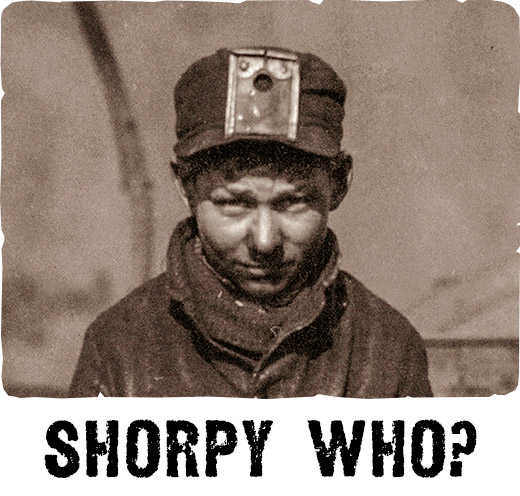
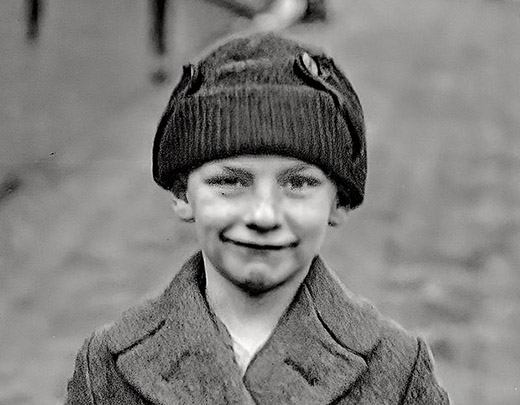
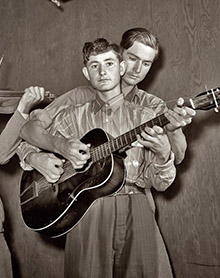

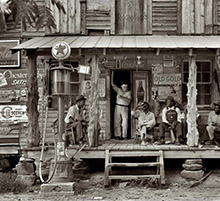

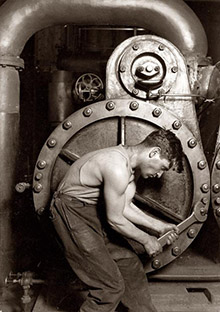





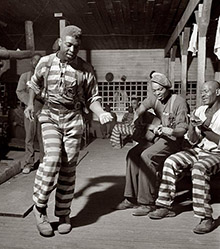

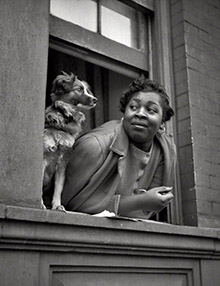

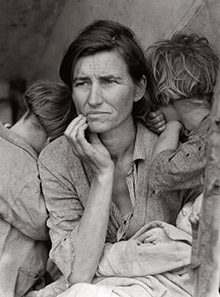

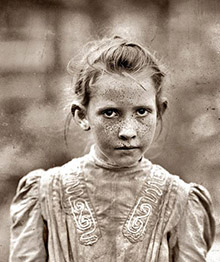
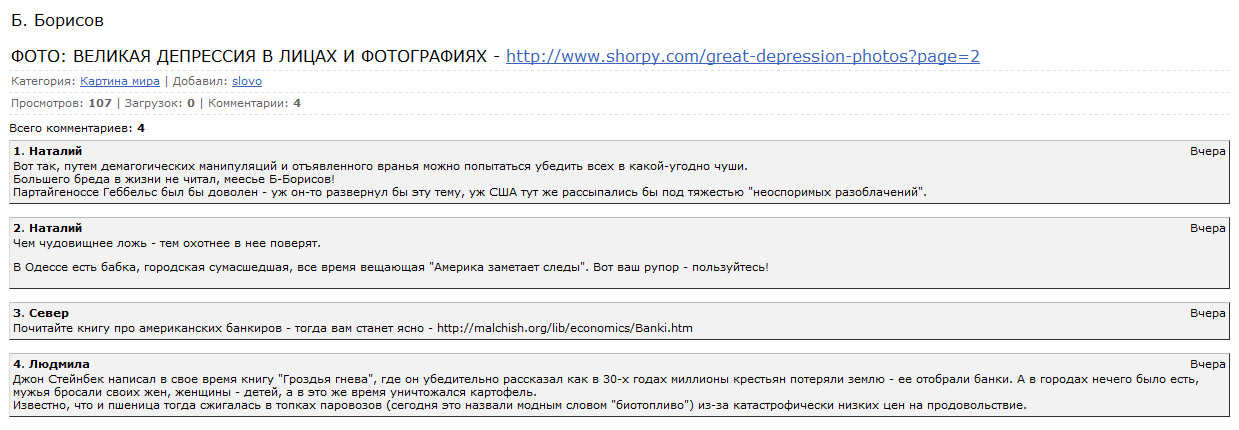
On Shorpy:
Today’s Top 5